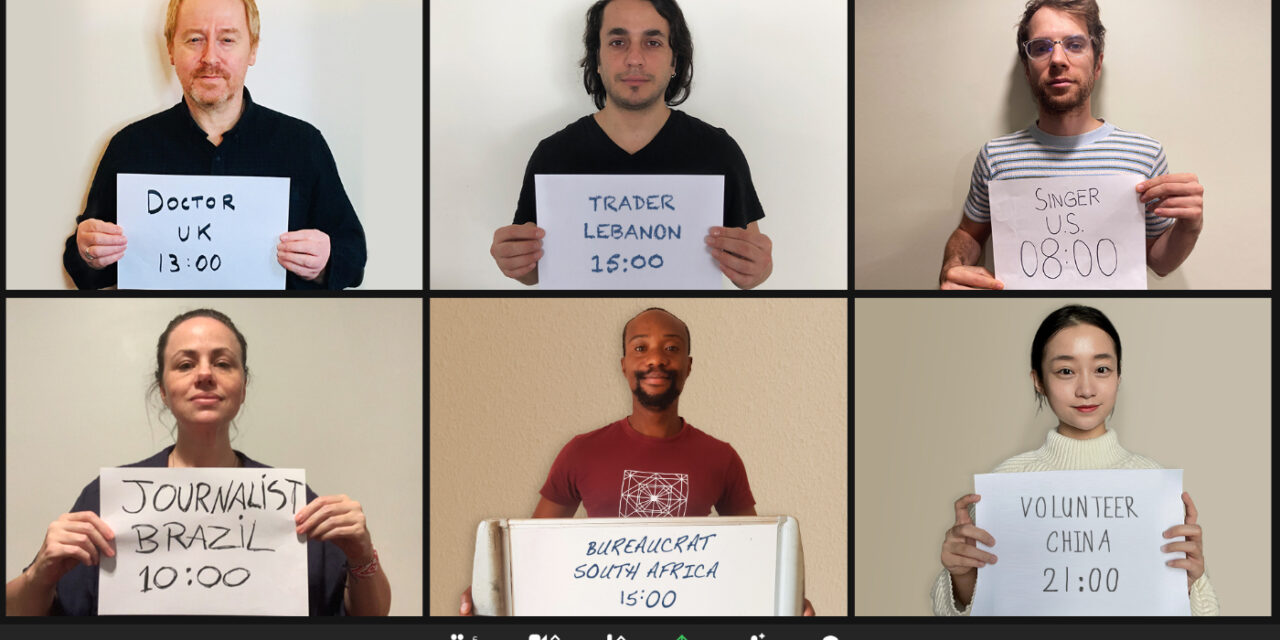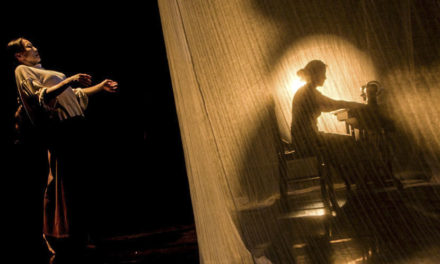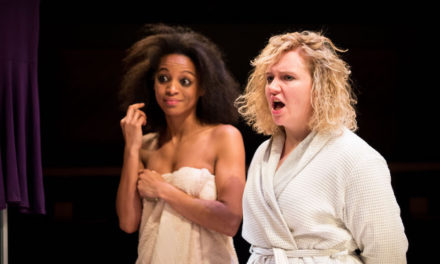The Hong Kong Arts Festival has simultaneously commissioned two provocative productions of Neil Bartlett’s The Plague, an adaptation of Albert Camus’ famous novella.
In 2016, an unusual political experiment took place in Hong Kong for one night only. According to the South China Morning Post, which sent a reporter to City Hall that evening, a delegation of Legislative Council members attended a Hong Kong Repertory performance to draw lessons from a work of theatre. The production was Anthony Chan Kam-kuen’s 1894 Hong Kong Plague: A Musical. The reason for the visit was not the one that jumps to mind in 2021, yet the experience raises a topical question: what can art teach government leaders, and indeed anyone, about the historic events we are living now?
The past year may have demonstrated how much we still have to learn about infectious diseases, but it has also made clear that epidemics present defining moments for societies and nations. With gruesome symptoms and a 70 percent mortality rate, the bubonic plague wreaked havoc for centuries until it was tamed by antibiotics. Hong Kong’s 1894 outbreak prompted an overhaul of the colony’s sanitation and, of interest to the lawmakers attending the Hong Kong Rep performance, an examination of best practices in Western and Chinese medicine and community governance.
But if the plague is like a garrulous super-spreader at a wedding, Covid-19 is the twenty-something who sleeps it off faster than a hangover; it may inspire more conspiracy theories than there are fleas on a rat but it doesn’t lend itself to sweeping drama. The novel coronavirus has given rise to theatre about exhausted health care workers and families anxiously hosting their first Zoom cocktail, but for Biblical-grade pestilence, nothing beats the Black Death to scare the bejeezus out of us.
To be clear, that is not why the Hong Kong Arts Festival commissioned two productions of British playwright Neil Bartlett’s The Plague, an adaptation of Albert Camus’ novella, La Peste. Rather, in James Chan Tai-yin’s minimalist production and in Beijing director Wang Chong’s live-streamed Zoom play—both available for view as recorded performances from May 25 to 31—audiences have an opportunity to discover two contrasting visions of a classic whose day has come for all the right reasons, and all the wrong ones too.
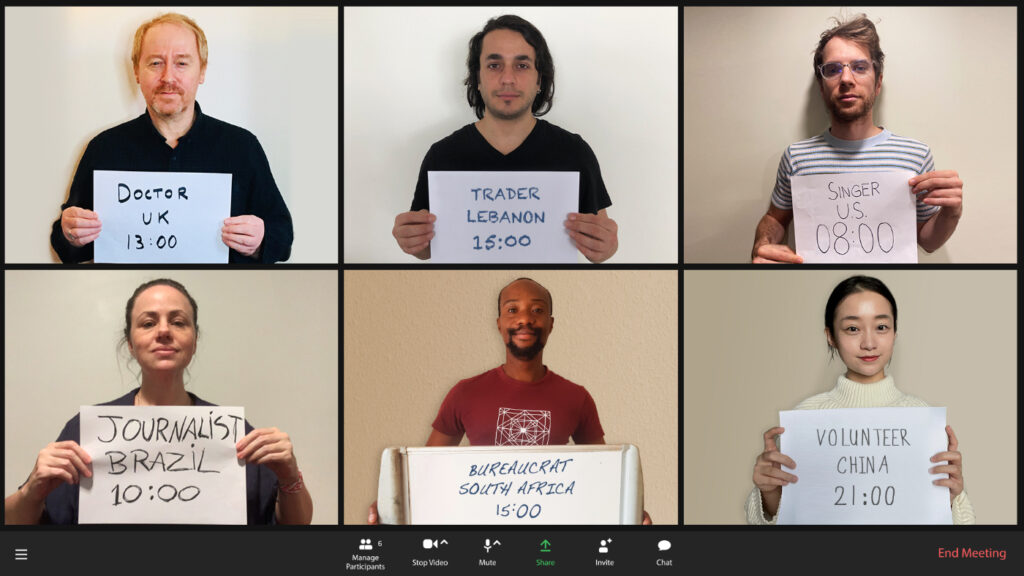
The Plague by Wang Chong. Forbes Masson (UK), Hashem Adnan (Lebanon), Henri Emond (US), Karine Teles (Brazil), Simpho Mathenjwa (South Africa), Sydney Zhao (China).
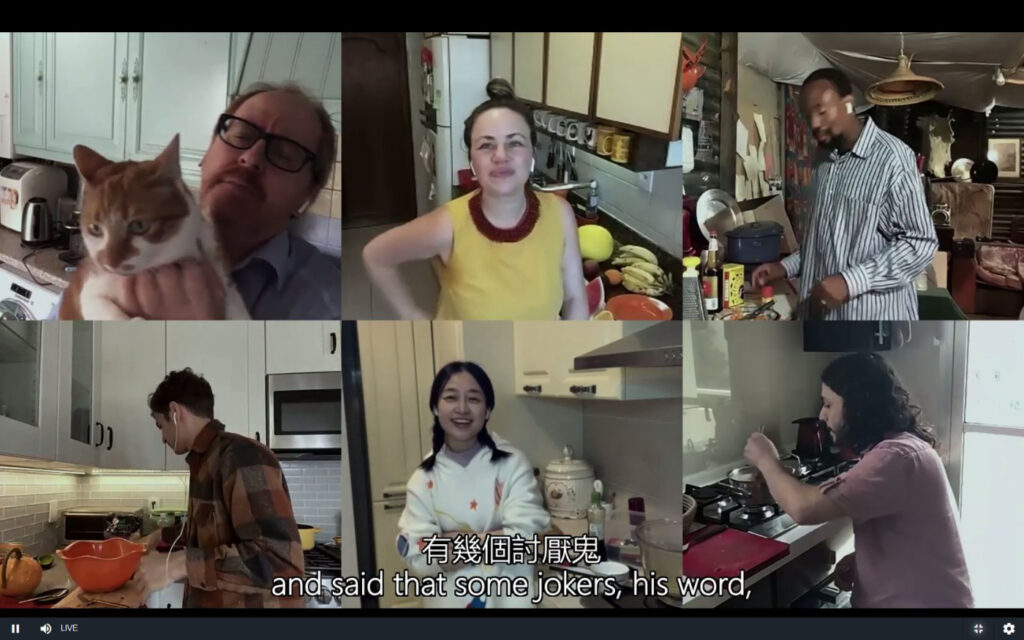
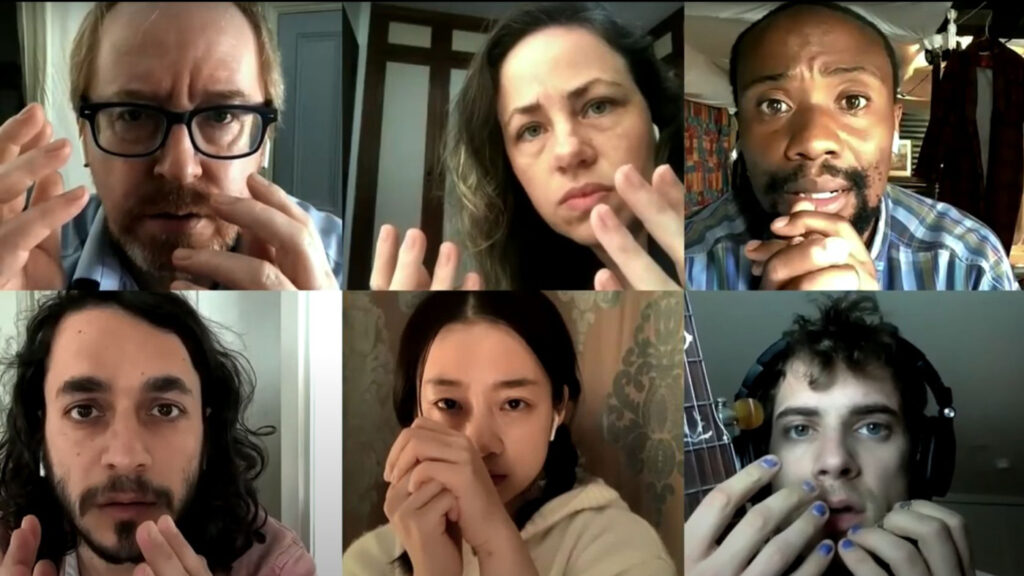
Anyone who has been schooled by the coronavirus in the finer points of epidemiology might assume that Bartlett seized on La Peste’s fictional outbreak of the plague in the Algerian city of Oran to dig into the politics of Covid-19. But Bartlett, a former artistic director of the Lyric Hammersmith, was not remotely interested in public health. When Barlett wrote the play in 2017, just after the Brexit referendum, his concerns lay with those of Camus—the rise of fascism in Europe. (La Peste was published in 1947 and the story was set in 1940, as far-right extremism plunged the world into war.) Now that La Peste’s health catastrophe has hit, the situation has reversed. “If anything, [the play] is harder to do now, it’s so real,” says Chan via Zoom, a few weeks after wrapping up filming. “It was meant to be a metaphor and it’s harder to be a metaphor now because it’s so tangible.”
Bartlett’s play distills Camus’ philosophical considerations and mounting crescendo of bizarre symptoms, rising caseloads, arguments about terminology, travel restrictions, the race for a serum, and overwhelmed morgues into a post-mortem inquiry meant to get at what happened and what went wrong. So familiar is that story now, Chan has taken care to separate it as much as possible from current events; a bare stage holds a single table, microphones and a few music stands, from which five actresses prepare their characters’ statements. “My job,” he reasons, “is to still make it a metaphor.”
For Wang, however, a literal reading of the text is exciting, necessary, and perhaps even unavoidable today. His approach was to dive into the pandemic with the lightning reflexes of an ER (Emergency Room) doctor, quickly deciding to livestream performers locked down in Brazil, China, Ireland, Lebanon, South Africa, and the United States. During a harbourfront walk, while Wang was preparing the play’s live premiere in March, he explains his thinking by citing a line from Camus: “The most useful way of describing a town is to say how people work there, how people love and how people die.”
“In our version, the town is obviously the globe,” Wang says in precisely clipped American English, honed from touring his multimedia company, Théâtre du rêve expérimental, to international festivals for the past decade. “Everyone is in a way in lockdown, it’s visible that the actors are in their homes. It’s really about the pandemic. Sometimes it’s premature to discuss a war during the war, but I just felt the urge to do it.”
At the time that So Kwok-wan, associate programme director at the Hong Kong Arts Festival, commissioned the plays, the spike protein had yet to bring the world to its knees. When the 2019 protests began in Hong Kong, So, who had seen a London production of The Plague in 2018, found in Camus’ allegory a “resonance” with what he described by phone as “this very particular thing that spread over the whole society while people at different levels were trying to control the spread of it.”
He commissioned Chan, who had recently graduated from London’s Royal Central School of Speech and Drama, to translate Bartlett’s text into a Cantonese production that would speak to the trauma of that period. Once the coronavirus appeared and China began to lock down in early 2020, So sensed a need to examine the literal story of The Plague as well, an idea seconded by Wang, who was frustrated by the early response to the outbreak in Wuhan.
In both readings of the text, Bartlett’s inquiry intersected So’s questions. “I think the point is not to say who’s right or who’s wrong,” he suggests. “You have different characters who stand for different kinds of people, and the interesting part is what is the responsibility in dealing with this deadly situation when everyone has to relate to people around them. How do they judge their actions?”
For his main stage directing debut, Chan cast five actresses as the doctor, journalist, civil servant, smuggler and tourist who are asked to account for the disease’s spread and their roles during the crisis. “The chemistry between women actors in Hong Kong—they’re very sensitive with the text and I think it opens up a little bit more depth or sensitivity,” he says. That stood in contrast to the polarising discussions and sometimes violent rhetoric that flew during the social movement.
“For me, [the play] is a lot about the negotiation between the personal and the public,” he adds. “It’s a hearing, and the characters are supposed to reveal only what the public is interested in. The strong argument from Neill’s production is that he is trying to push the boundary of how far can we go when we discuss a social issue publicly without discussing private or personal thinking.”
A fresh face in Hong Kong performing arts, Chan boasts a solid background in collaborative and devised theatre and previous stage work with experimental Irish director Sinéad Rushe. His adaptation of The Plague takes a cue from Rushe’s interpretation of Bernard-Marie Koltès’ Night Just Before the Forests (Macao Arts Festival, 2018), which created a rich sound atmosphere to explore Koltes’ raw and poetic language. Chan’s choral approach to Bartlett’s play invites the audience to feel Camus’ eerily familiar world rather than succumb to the tendency to rationalize it.
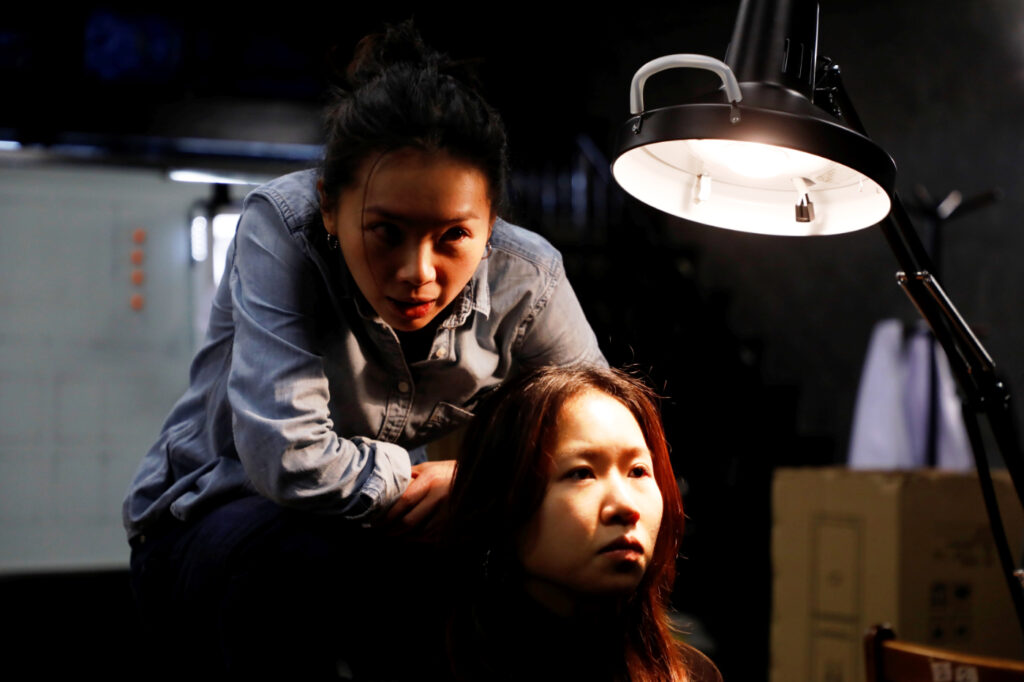
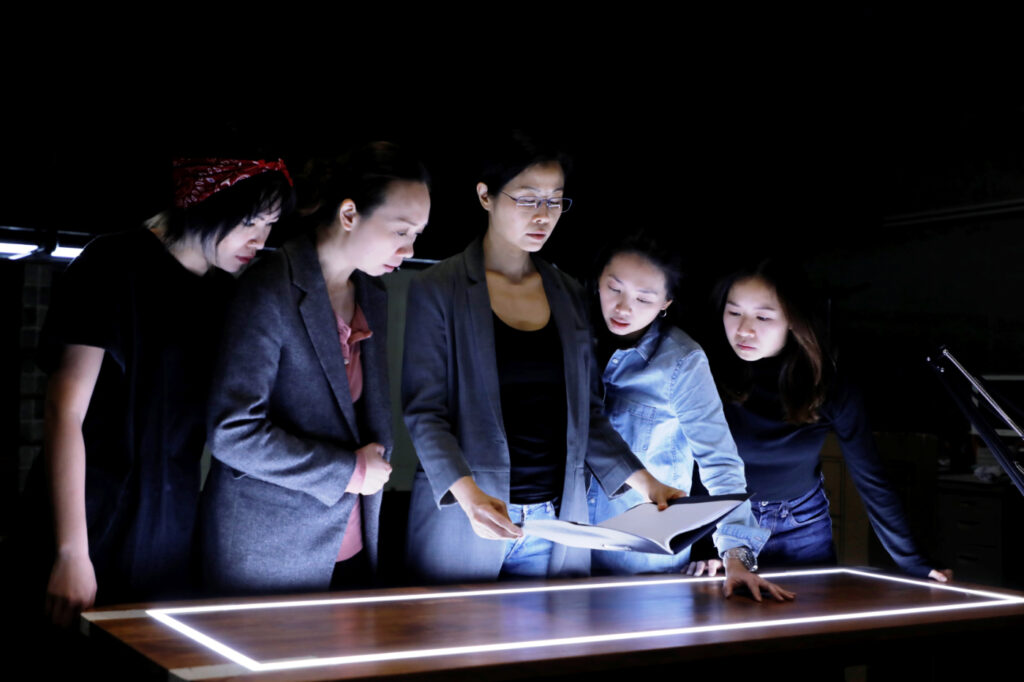
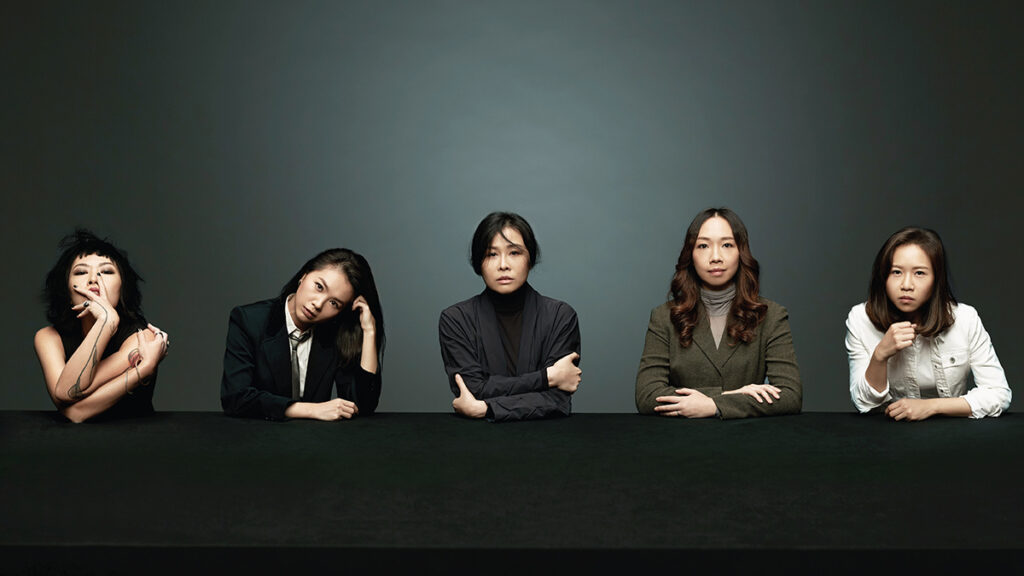
The Plague by James Chan Tai-yin features a full female cast including Wan Yuk-yu, Birdy Wong, Annie Cheung, Ceci Chan, and Luk Ka-ki (from left to right). Photo credit: R Workshop, courtesy HKAF.
The negotiation between personal and private spheres is front and center in Wang’s made-for-Zoom production, which captures the actors’ at home, cooking, lying in bed or in a bathtub, and using any available space to accompany the narrative as it moves through a fictional city. Willingness to overshare in that sense was a prerequisite to audition, Wang said, a situation that created some difficulties for actors who found themselves couch-surfing or living with parents during the uncertainties of the pandemic. “We had this concept of putting your family as theatre, not as your family per se, [but] as neutral spaces, and transform them into something else. Reaching the right people and making them comfortable was not super easy.”
Yet Wang never doubted that this was the form he wanted to pursue. Over the past year, the so-called “Zoom play” has become increasingly common, but it was still an unproven concept when Wang decided on the medium in early 2020. He began by directing Samuel Beckett’s Waiting for Godot using a Chinese Zoom equivalent, Tencent Meeting, with actors quarantined in different mainland cities. Even at the height of the pandemic in China, Wang remembers, “I was so excited for something to happen in theatre like that. [I told myself] this is the right place, this is the right piece, and we have to put it together.” The play received 290,000 views, which was enough to convince him he was onto something.
If Wang’s Godot offers a snapshot of China in lockdown, his Plague is a tech-savvy citizen of the world. The production required more sophisticated streaming and editing—although Wang confesses disappointment with the limits of the technology—and beams to us from a street in Queens, a deserted Johannesburg suburb, and from beneath Rio’s Christ the Redeemer statue. Wang also put to use whatever tools the actors had on hand. Jelly doughnuts stand in for rats, a marmalade cat has a cameo as a concierge and a spotlight in a darkened room reveals the mind of a character in distress. The actors may have felt constrained at home but the audience travels thousands of miles.
Which is not to say the production will leave you humming “It’s A Small World” or feeling grateful for human ingenuity; Wang turns a reproving gaze on the global community’s handling of the pandemic. While his initial anger was aimed at China, his condemnation has now gone global. “I’m still critical,” he says, but he now expounds a more phlegmatic view. “If it’s not in Wuhan, if it’s in some other city in the world, probably the result wouldn’t have been any different. You’re just gaining time for other governments to develop vaccines.”
Has The Plague become the text of our times? Can art open a path to social reflection and political dialogue? Like their artistic approaches, Chan and Wang offered distinct responses. “This work really affects myself a lot,” says Chan. “From every word that Camus is talking about, he persuaded me that [the political and social climate in Hong Kong] is just an endless loop if we keep disagreeing with other people. I think his work is very strong in saying that, either reasonably or emotionally, you will have to work together as a society. I hope that people who like art will try to understand this.”
For Wang, the literal and metaphorical readings of the text matter less now than how theatre is responding to the new paradigms ushered in by Covid. “The pandemic is definitely giving a chance for theatre makers to imagine the future of the performing arts,” he says with a note of exhilaration in his voice. “Of course, the classical way of doing it, outdoors, indoors, is still going to happen. But I just imagine that people are eventually going to do it virtually, in game settings, in virtual spaces and also in terms of space.
“One day, when people are on different planets, or some people are on satellites, we can do theatre for each other,” he continues. “It’s just where the technology leads us [and] teaches us as human beings.” If the key to dreaming the societies of the future can be had for only the price of a theatre ticket, it’s a great time to invite the politicians back.
Both productions of The Plague stream from May 25 to 31, 2021 in English and Cantonese.
This article was originally published by Zolima City Mag on May 19, 2021, and has been reposted with permission. To read the original article, click here.
This post was written by the author in their personal capacity.The opinions expressed in this article are the author’s own and do not reflect the view of The Theatre Times, their staff or collaborators.
This post was written by Molly Grogan.
The views expressed here belong to the author and do not necessarily reflect our views and opinions.

